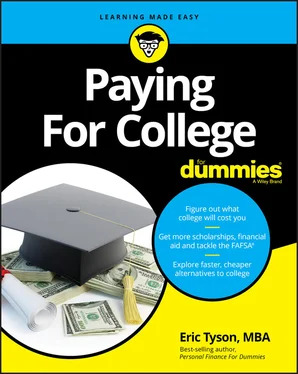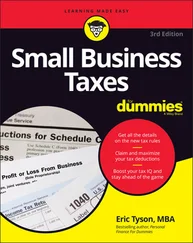Looking at How College Pricing Works
Now, time for some better news. Despite having dropped a bunch of respected college names on you earlier in this chapter that most people believe are “top” or “premier” colleges, I’m not suggesting that you need to attend a brand-name college and spend hundreds of thousands of dollars for your child to get a great higher education. You and they don’t have to do that in order to find a fulfilling job or career with good compensation.
Even if you do aspire to a costly private college for your offspring, you should know that the average price that colleges typically charge and collect from each family equals about half of the stated full cost of attendance. So, for example, with private colleges charging around $60K per year the average family is actually paying about half of that or $30K. This happens due to “financial aid,” which is another way of saying that a college or university will charge you and your family less the less able they deem you to pay the full retail price. High-income and affluent families generally pay full price or near full price unless their son or daughter qualifies for some sort of athletic or merit-type scholarship (price reduction). Some colleges, for example, Ivy League colleges, don’t offer these types of scholarships and only offer so-called need-based scholarships (price reductions). Check out Chapter 11for more on scholarships.
Of course, first and foremost, colleges will evaluate your child’s academic record including high school grades, standardized test scores, and so on. College applications also ask students to document what they’ve done outside of the classroom.
Parents, students, and even some well-intentioned high school personnel have all sorts of misconceptions and misperceptions as to how colleges evaluate applicants. Chapters 4and 5pull back the curtain on that process and provide you with the information you need to know.
College pricing and associated “financial aid” is even more poorly understood and for good reason. You will have to answer scores of questions about your financial and family situation and then submit that information in order for the college, through their own black box process, to tell you the price they will charge your family. See Chapter 6for a thorough overview of that process.
You should be in the habit of saving money towards your financial and personal goals. Helping to pay college or other higher education expenses is likely one of your goals.
You need to be careful, though, as to how and where you save your money if you plan to apply for financial aid, get favorable pricing, and want to minimize your income tax bills. Chapters 2and 9will help get you off on the right foot financially.
Somebody give me some money!
Financial aid is a misnomer. When your kids apply to college, you will need to complete various financial aid forms. The information you provide on those forms will be used by colleges to determine how much to charge you. I explain in Chapter 10how to best complete that process.
Borrowing money and seeking grants and scholarships helps close the gap between what a family can afford and a college’s full sticker price. Chapter 11covers how those things work.
Employment Reality and What Students Say They Want from College
Increasingly, surveys show that students’ biggest objective for their college education is not surprisingly for their job, career and income prospects. And for good reason — a four-year college degree is time consuming and costly and parents and students rightfully want to see a return on that huge investment.
 Unfortunately, many existing degree programs are not well aligned to graduate’s first jobs and only 16 percent of students believe college is preparing them for their first jobs. I’ve known plenty of students who end up at a particular college because they or their parents thought the name and image it carried was good. I can’t emphasize enough and it’s a point which will recur throughout this book that you should take the time and effort to explore what it is you’re actually signing up for at a given school that on the surface seems appealing.
Unfortunately, many existing degree programs are not well aligned to graduate’s first jobs and only 16 percent of students believe college is preparing them for their first jobs. I’ve known plenty of students who end up at a particular college because they or their parents thought the name and image it carried was good. I can’t emphasize enough and it’s a point which will recur throughout this book that you should take the time and effort to explore what it is you’re actually signing up for at a given school that on the surface seems appealing.
With regards to college not actually prepping students for their first jobs, in his book, “A New U: Faster + Cheaper Alternatives to College” (BenBella), Ryan Craig cites the former Computer Science chairperson at Yale (where both Craig and I graduated from) Roger Schank, as saying that the faculty in that department are mostly theoreticians who don’t now do programming anymore and instead are interested in teaching about new ideas and their latest theories. Schank was hearing increasing numbers of complaints from Yale undergrads who were being snubbed in hiring by Google. Schank also cites how the head of Columbia University’s economics department told him that calculus is required for the major simply to reduce the volume of students who want to work in finance and seek out the major.
“Many faculty members resist the idea that teaching should be aligned to employment opportunities,” says Craig.
He provides numerous examples of colleges failing to ever solicit input from employers as to what they should consider teaching undergraduates.
“The implication — one that is absolutely in the mainstream of faculty thinking — is that updating curriculum to reflect current labor market needs may not be a worthwhile pursuit because such needs will change in five to ten years. Can you imagine similar thinking in any other sector of the economy?”
This is, of course, ridiculous. Even though colleges like my alma mater Yale charge big bucks to families for the educational services they are providing, they don’t think enough of the students and their parents who are paying the bills as their customers. Hence, the disconnect about best preparing their graduates for the modern job market.
Career services is another area where colleges and universities too often fail to meet the employment imperative. I frequently hear this complaint from parents and college students alike including from top name schools. With increasing recruiting and hiring being done online, fewer employers are finding the need to recruit on campus and go through career services.
What students actually do in college
After running the gauntlet of various honors and advanced placement courses in high school and participating in after school activities and doing endless homework assignments nightly, some students find college to be dare I say a tad easier. This is generally true for students who graduated from a demanding high school that offered lots of Advanced Placement and other challenging college level courses. Many students find that they have more free time, in part because they don’t actually spend much time in class in college compared with high school.
Numerous studies raise questions about the critical thinking skills of college graduates which isn’t surprising given how most students spend their time in college and given what some schools and courses actually require of them. According to the Heritage Foundation, the average college student spends only about 2.8 hours per day on education-related activities. By contrast, college students are averaging 4.4 hours per day on leisure activities (e.g. playing video games, working out at the gym, perusing social media, etc.) which doesn’t include shopping, grooming, personal care, housework, cooking and eating.
Читать дальше

 Unfortunately, many existing degree programs are not well aligned to graduate’s first jobs and only 16 percent of students believe college is preparing them for their first jobs. I’ve known plenty of students who end up at a particular college because they or their parents thought the name and image it carried was good. I can’t emphasize enough and it’s a point which will recur throughout this book that you should take the time and effort to explore what it is you’re actually signing up for at a given school that on the surface seems appealing.
Unfortunately, many existing degree programs are not well aligned to graduate’s first jobs and only 16 percent of students believe college is preparing them for their first jobs. I’ve known plenty of students who end up at a particular college because they or their parents thought the name and image it carried was good. I can’t emphasize enough and it’s a point which will recur throughout this book that you should take the time and effort to explore what it is you’re actually signing up for at a given school that on the surface seems appealing.










